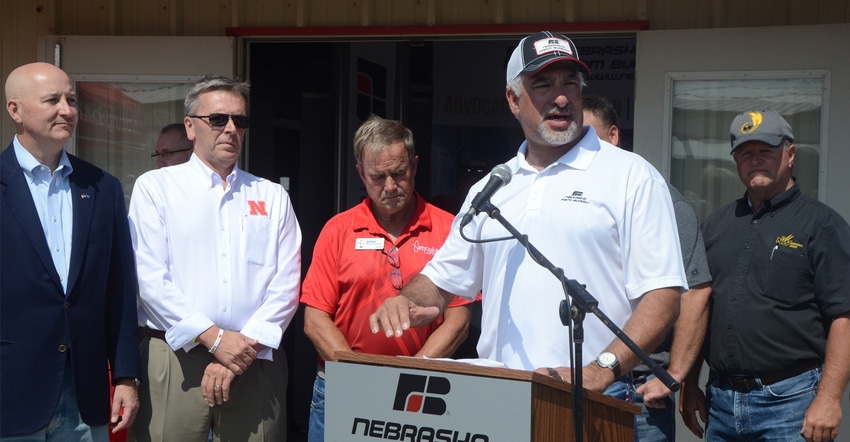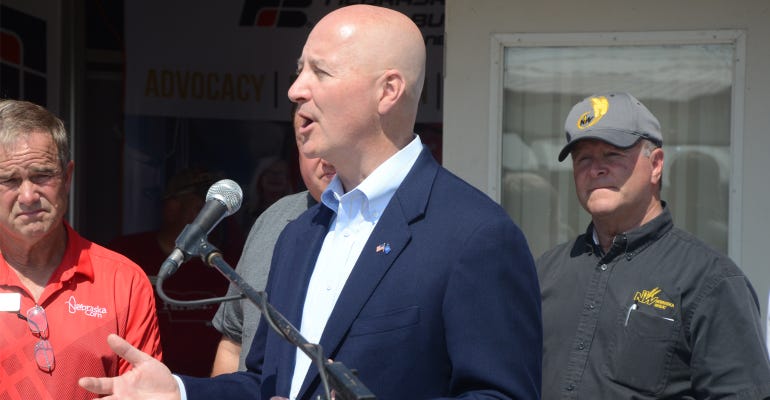
When it comes to exports, the biggest buyers of ag products from the U.S. are its neighbors to the south and north. Mexico and Canada collectively purchase 21% of all ag products exported from Nebraska.
That's one reason farmers and ranchers and ag organizations — joined by Nebraska Gov. Pete Ricketts and University of Nebraska-Lincoln Chancellor Ronnie Green at a media event at Husker Harvest Days — urged the swift ratification of the United States-Mexico-Canada Agreement, intended to replace the 20-year-old North American Free Trade Agreement between the U.S., Canada and Mexico.
Mark McHargue, vice president, Nebraska Farm Bureau, thanked President Donald Trump and his administration for negotiating the agreement, but noted Congress still needs to approve the deal.
"As farmers, we work all winter to calibrate our planters, buy the seed, get the fertilizer," McHargue said. "We're all ready, [the planter's] sitting in the barn, we're just waiting for the weather to break to get out there and actually do something. It's time today for USMCA. It's time to actually take action. It's time to get out of the barn and actually do something. We know this will bring a solid win for agriculture and especially for Nebraska agriculture."
Ricketts noted 2019 hasn't been easy on farmers and ranchers.
"This has probably been the toughest year for agriculture since I've been governor," he said. "Between the weather we had earlier this year, the blizzards and the flooding, what's been going on with the Renewable Fuels Standard, NASS numbers, the fire in Holcomb, this has all contributed to a very stressful time in agriculture — and we've got low commodity prices. But one of the ways we know we can help support those commodity prices is by opening up markets overseas —international trade."
Ricketts, who recently returned from a trade mission to Vietnam and Japan, noted ag exports from the U.S. to Vietnam rose more than 50% in 2018, going from $2.5 billion to $4 billion — and ag exports from Nebraska more than tripled in that single year. Meanwhile, the U.S. is working with Japan to negotiate a free trade agreement that would reduce tariffs on certain U.S. ag products such as beef.
"You can see these are import markets, but Mexico and Canada top the list," Ricketts said. "They buy over $1 billion worth of products from us each and every year. Mexico is our top destination for things like corn and wheat and dairy, and No. 2 for soybeans. Canada is No. 2 for prepared foods, for pet foods, No. 2 in pork and dairy. These are top markets for us, and that's why it's so important that we get USMCA ratified."
Ricketts urged Speaker of the House Nancy Pelosi to bring the agreement to a vote and urged Congress to ratify the agreement to improve market access for U.S. agricultural products.
"This is a big deal," Ricketts said. "So please, any way you can, whether it's on social media, reaching out to our congressmen here or if you know congressmen in other states, let them know how important USMCA is to our farmers and ranchers, why this is such a big deal that we get this on the floor and voted on, so that this important trade deal that President Trump negotiated can get implemented."

TOP MARKETS: Nebraska Gov. Pete Ricketts noted Mexico and Canada top the list of markets for ag products from Nebraska and the U.S.

UNL Chancellor Ronnie Green cited the late Clayton Yeutter, his longtime friend and mentor, an expert on international trade, and the namesake of the Clayton Yeutter International Institute of Trade and Finance.
"Many of you know Clayton's name, know his history and his legacy, especially in trade and the opening up of trade back into the late 1980s when the U.S. Canada Free Trade Agreement was first negotiated in 1989 followed by NAFTA in 1994," Green said. "And I know if Clayton was here today, he would reiterate and say… how critically important it is that we have this open access to trade, especially with Mexico and Canada and the ratification importance of the U.S.-Mexico-Canada Agreement getting done."
"Mexico and Canada are our two leading trading partners," Green added. "And the impact of the over $3 billion in agriculture in recent years that has gone to those two trading partners can't be underestimated in the value of getting that opened up. There is an agreement that has been put in place. It is our hope that Congress will see fit to move forward on this and to ratify this agreement to be able to allow those channels to operate in the future."
Dan Nerud, president of the Nebraska Corn Growers Association who farms near Dorchester, noted growers have been dealing with a number of challenges the past several years — and 2019 has been no exception.
"Fortunately, there is a glimmer of hope and light and that is the USMCA," Nerud said. "It's a giant step in ensuring a continued partner for our state's corn farmers. Building upon the success of NAFTA, USMCA is critical to our livelihoods as corn farmers.
"Canada and Mexico purchase more than 30% of Nebraska's corn exports, which equates to over $300 million in value. USMCA is also important as both Canada and Mexico import many value-added products derived from corn, such as ethanol, beef and dairy, pork, processed foods, and over $27 million in distillers grain."
Bob Larson, a dairy farmer from Creston representing the Nebraska State Dairy Association, said the survival of dairy farms like his is dependent on free-flowing trade of dairy products to international markets — which is why it's important to ratify the USMCA quickly.
"The continued success of my family's farm requires dependable and growing export markets that expand demand for the milk we produce in Creston, Neb.," Larson said. "Mexico is by far our largest customer. Last year, the dairy industry exported more than $5 billion in dairy products, with about a quarter of that going to Mexico alone — the equivalent of nearly 3 million gallons of milk crossing the border into Mexico every single day. For farmers, that means the average dairy cow produces 2.7 pounds of milk daily that goes to the Mexican market."
"Thankfully, USMCA will safeguard our market in Mexico for American dairy products and expand our opportunities to sell products into Canada, restoring certainty to our trading relationships with our North American neighbors and bringing increased prosperity for farmers in Nebraska," Larson added. "All told, the U.S. government estimates that USMCA will provide more than $3 million in new dairy sales to markets around the world, and those new dairy sales abroad will translate to economic benefits here at home in Nebraska."
Nate Blum, executive director of the Nebraska Sorghum Producers Association, emphasized international trade is not a Republican-versus-Democrat or rural-versus-urban issue. He also pointed out that Mexico already has ratified the agreement, and Canada is waiting for the U.S. to act.
"Trade lifts all boats. It's the rising tide that lifts all of us across the country," Blum said. "When the Nebraska farmer, when the American farmer does well, the folks that do business with him and/or her also do well. The passage of USMCA can't be looked at as a win for the president versus a defeat for the administration. It has to be looked at as a win for the American people. We need to put the needs of the people first, the needs of the country, the needs of the economy."
"It should be known that the Mexican government has already ratified the agreement, and the Canadians are just waiting on us to take action here," Blum added. "The Nebraska Sorghum Producers Association strongly urges not only our Nebraska delegation, but all members of Congress to put aside partisan differences, to work together for the benefit of this nation. That's what our children and grandchildren will remember — not who gave who a win, but how we all won together."
About the Author(s)
You May Also Like






